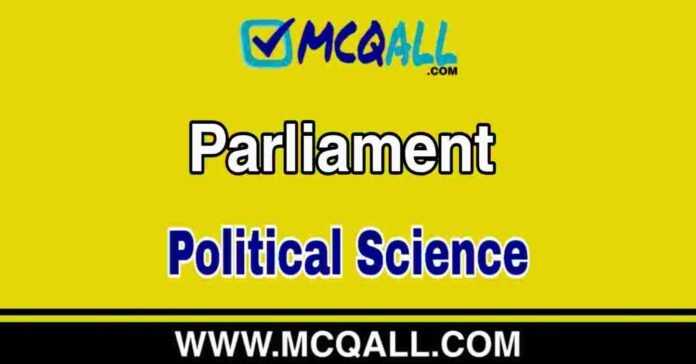Parliament – Political Science MCQ Question and Answer
Parliament – Political Science MCQ Question and Answer : Parliament – Political Science MCQ Question and Answer is given below. This Parliament – Political Science MCQ / Parliament – Political Science Quiz / Parliament – Political Science Question and Answer / Parliament – Political Science Multiple Choice Question, Short Question, Question and Answer, Suggestion, Notes are very important for school, college and various competitive or job exams and interviews.
Those of you who are looking for Parliament – Political Science MCQ Question and Answer, can read the questions and answers given below.
Parliament – Political Science MCQ
- What is the quorum of Lok Sabha in relation to its strength ?
(A) 1/3
(B) 1/5
(C) 1/11
(D) 1/10
Answer : 1/10
Solution: Article 100 of the Constitution of India stipulates that at least 10% of total number of members of the House must be present to constitute the quorum to constitute a meeting of either House of Parliament
- In case the Deputy Speaker is presiding the Lok Sabha he has right to –
(A) Take part in its deliberations
(B) Vote in on any proposition before the house as a member
(C) Vote in the event of equality of votes
(D) No right to preside a joint sitting of the House of parliament in case the Speaker is absent
Answer : Vote in the event of equality of votes
Solution: According to Article 95 of the Indian Constitution, when the office of Speaker is vacant, it shall be performed by Deputy Speaker where he can vote in the event of an equality of votes while other are not the rights of Speaker.
- Which one of the following statements correctly describes the Fourth Schedule of the Constitution of india ?
(A) It lists the distrubution of powers between the union and the State.
(B) It contains the languages listed in the constitution.
(C) It contains provision for the administration of tribal areas.
(D) It allocates seats in the council of state.
Answer : It allocates seats in the council of state.
Solution: The Fourth Schedule allocates seats for each State of India in the Council of States. The 7th Schedule deals with allocation of powers and functions between the Union and the State. Under 8th Schedule, a list of 22 languages of India is recognized by the Constitution. The 5th and 6th Schedule give provisions for administration and control of Scheduled Areas and Tribes.
- What could be the maximum time limit of ” Zero Hour ” in the Lok Sabha ?
(A) 30 Minites
(B) One hour
(C) Indefinite period
(D) Two hours
Answer : One hour
Solution: The time immediately following the Question Hour has come to be known as “Zero Hour”. It starts at around 12 noon (hence the name) and members can, with prior notice to the Speaker, raise issues of importance during this time.The total time allocated for Zero Hour is 30 minutes wherein a member gets three minutes to raise the issue. The session should be completed before 1 pm
- Which one of the following statements about a Money Bill is not correct ?
(A) A Money Bill can be tabled in the either House of parliament
(B) The Speaker of Lok Sabha is the final authority to decide whether a Bill is a Money Bill or not
(C) The Rajya Sabha must return a Money bill passed by the Lok Sabha and send it for consideration within 14 days
(D) The president can not return a Money Bill to the Lok Sabha for reconsideration
Answer : A Money Bill can be tabled in the either House of parliament
Solution: A Money Bill can be introduced in Lok Sabha only. Rajya Sabha has got very limited power in this regard. Rajya Sabha can delay this for a period not exceeding 14 days.
- The provision for the Calling Attention Notices has restricted the scope of which of the following ?
(A) Short duration discussion
(B) Question Hour
(C) Adjournment Motion
(D) Zero Hour
Answer : Adjournment Motion
Solution: The concept of Calling Attention is given by India. It is a new concept of the modern Parliamentary procedure. Question and supplementary questions are asked during this – parliamentary procedure. The Parliament can move the call attention motion to call the attention of a minister towards any matter of urgent public importance. It is like an Adjournment Motion, but It does not have the part of condemnation.
- On which of the following, a parliamentary Committee has not been set up ?
(A) Public Undertaking
(B) Government Assurances
(C) Estimates
(D) Welfare of Minorities
Answer : Welfare of Minorities
Solution: The Public Undertakings Committee of the Parliament examines the report of the Comptroller and Auditor General (if any) in the context of the public sector enterprises and also examines the efficiency of management and handling of public sector enterprises. Committee on Government Assurances of each House monitors assurances, promises made by Ministers and resolution until they are implemented in their tracks. Estimates Committee of the Parliament monitors the examination of estimates, austerity and the expenditure of funds. No Parliamentary committee has been set up for the welfare of minorities instead of this Minority Commission has been set up.
- The Right to Information Act of parliament received the assent iof the President of India on –
(A) 15 th May 2005
(B) 15 th মে 2005
(C) 15 th June, 2005
(D) 12 th October, 2005
Answer : 15 th June, 2005
Solution: The Right to Information Act was passed on 11 May, 2005 by the Lok Sabha and on 12 May, 2005 by the Rajya Sabha and received the assent of the then President late Dr. APJ Abdul Kalam on June 15, 2005. It came into force after 120 days on (12-13 midnight) October 12, 2005.
- The age of retirement for the judge of supreme Court is-
(A) 62 Years
(B) 63 Years
(C) 64 Years
(D) 65 Years
Answer : 65 Years
Solution: The retirement age of the Judge of the supreme Court is 65 years while the age of the High Courts is 62 years.
- Who has the right to seek advisory opinion of the Supreme Court on any question of law –
(A) Prime Minister
(B) President
(C) Any High Court
(D) All of the above
Answer : President
Solution: Article 143 of the Constitution of India deals with ‘ power of president to Consult Supreme Court.’
Political Science MCQ Question and Answer
See also: – Political Science MCQ Question and Answer Click Here
Parliament – Political Science MCQ Question and Answer
Parliament – Political Science MCQ Question and Answer: Parliament – Political Science MCQ Question and Answer – Parliament – Political Science MCQ Question and Answer has been discussed above.
Parliament – Political Science Multiple Choice Question and Answer
Parliament – Political Science Multiple Choice Question and Answer: Parliament – Political Science Multiple Choice Question and Answer – Parliament – Political Science Multiple Choice Question and Answer discussed above.
Parliament – Political Science Quiz
Parliament – Political Science Quiz : Parliament – Political Science Quiz – Parliament – Political Science Quiz has been discussed above.
Parliament – Political Science Question and Answer in English
Parliament – Political Science Question and Answer in English: Parliament – Political Science Question and Answer in English – Parliament – Political Science Question and Answer in English.
Parliament – Political Science MCQ Question and Answer
If you benefit from this “Parliament – Political Science MCQ Question and Answer” post then our efforts will be successful. Also visit our MCQALL.COM website or follow us on various social networking sites (Telegram, Facebook, Youtube, Instagram, Twitter) to know MCQ – Multiple Choice Question Quiz on various topics, questions and answers quiz from GK and Daily Current Affairs. Thank you.












